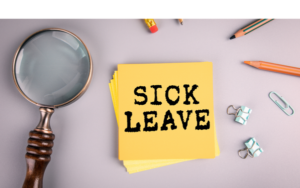 Almost 190 million work days were lost to sickness or injury in 2022 - the highest number in almost a decade and a statistic that is likely to leave many of us questioning how we would cope if we were to get sick and be unable to work. Sick pay can vary and will often depend on the type of contract you have and is often paid at the discretion of your employer. Some companies may only provide Statutory Sick Pay benefit (SSP) - explained in more detail later in this article - while others may provide a top up for a number of days, weeks or months.
Almost 190 million work days were lost to sickness or injury in 2022 - the highest number in almost a decade and a statistic that is likely to leave many of us questioning how we would cope if we were to get sick and be unable to work. Sick pay can vary and will often depend on the type of contract you have and is often paid at the discretion of your employer. Some companies may only provide Statutory Sick Pay benefit (SSP) - explained in more detail later in this article - while others may provide a top up for a number of days, weeks or months.
In this article, we explain what happens when sick pay runs out and how you can get private sick pay insurance so that you do not have to depend on your employer or state benefits. You can skip ahead to "Sick pay insurance - how does it work" if you would like to know more about purchasing sick pay insurance.
1 minute summary
- You can receive Statutory Sick Pay (SSP) from the fourth day you are off sick
- You can get £109.40 per week Statutory Sick Pay, paid for up to 28 weeks
- If employed, you may be entitled to additional sick pay but it is at the discretion of your employer
- If you run out of SSP then you may be entitled to other benefits such as Employment and Support Allowance (ESA) or Personal Independence payments (PIP).
- If your income has been significantly impacted by sickness or injury then you should also look at Universal Credit
- Income protection insurance – often referred to as sick pay insurance – can provide a replacement income if you are unable to work for long periods through illness or injury
- Complete this short form* to get an income protection quote from an independent specialist. You'll also qualify for up to £100 cashback if you take out a policy
What is sick pay?
Sick pay is income that you can continue to receive while you are ill or injured, making you unable to do your normal occupational duties. It can be equivalent to your normal income, a proportion of your income or the government statutory sick pay (SSP) amount. You may be required to present a fit note from your doctor to confirm your incapacity to work and you may be required to produce another fit note once you are ready to return to work for health and safety reasons depending on your employer's policy.
Employer sick pay
Your employer's sick pay scheme may pay more than the statutory amount employers are required to, which is dictated by the state. Depending on the terms of your employment contract the amount and duration of sick pay you could receive will vary. Some employers do not offer additional contractual sick pay and will only pay statutory sick pay benefits through payroll if an employee becomes unable to work. Others provide a specific number of days that will be paid at your normal salary, beyond which, sick pay may be paid on a discretionary basis. It is best to check your employment contract to understand what sick pay you would be entitled to if you became unable to carry out your normal job.
State sick pay
Statutory sick pay (SSP) is what the state guarantees and is paid by your employer, through payroll but is capped at £109.40 per week and is payable after the first 3 days of sickness. Sickness days must be concurrent and can include non-working days. SSP is paid for up to a maximum of 28 weeks but will stop before this if you are fit for work. Employment support allowance is a state benefit that can be claimed by those who may not qualify for SSP.
You can read more about statutory sick pay in our article, “What is Statutory sick pay (SSP)?“.
How long does sick pay last?
State sick pay
Statutory sick pay can last for up to 28 weeks in any three-year period. It is a statutory payment that is guaranteed by Her Majesty's Revenue and Customs (HMRC) as long as you earn at least an average of £123 per week. There are exceptions to qualifying for sick pay in some cases such as if you work outside the EU and do not make national insurance contributions. If you receive Employment and Support Allowance (ESA), this can pay out for up to a year in most cases, but some types of ESA can pay out for longer periods. You can check how much you may be entitled to by checking your eligibility on the Gov.UK website.
Employer sick pay
Employers can offer varying contractual sick pay terms that range from full pay for a period of time to none, depending on the terms of your employment contract. It is quite common for employers to offer sick pay schemes that give employees up to 10 days of sickness at full pay in an employment contract, meaning the employer will pay staff for 10 days of sickness each year before moving onto statutory sick pay for longer periods of absence. Some employers even provide a group income protection insurance benefit, meaning that employees can continue to receive sick pay through an insurance company for long-term absences, funded by the group income protection insurance policy.
What happens after your employer's sick pay runs out?
If your employer is paying you over and above the statutory sick pay amount and this comes to an end, you will continue to receive the statutory amount of £109.40 per week until you reach 28 weeks since you started your sick pay period. If you are still unable to do your job after 28 weeks of sick leave, you will no longer be entitled to sick pay. Your employer may use their discretion and continue to pay you whilst you are off ill but this is rarely the case.
Up to £100 cashback on income protection insurance
Our partner LifeSearch will help you get the best and cheapest income protection.
- Search the market and all the leading insurers
- Free advice with no obligation to purchase
- Up to £100 cashback for new customers
What happens after 28 weeks of statutory sick pay?
If after 28 weeks of sickness absence, you remain unable to return to work, you will stop receiving statutory sick pay. However, you can apply for other state benefits depending on the type of incapacity you are suffering. You can apply for the new style employment and support allowance (ESA) if you run out of statutory sick pay. It is also possible to apply for personal independence payments (PIP) if you become unable to carry out daily tasks on a long-term basis. Some households can look to Universal Credit for extra financial support depending on how much money is still coming into their household. Households could also qualify for financial assistance that includes free school meals and housing cost support.
It is worth noting that you can continue to accrue holiday during periods of sickness and, depending on your contract, get paid for these
If your employment contract provides you with sick pay for longer than 28 weeks then you're in a unique and fortunate position. For those employees with limited work sick pay from their employer, state benefits may leave their household short of income to meet their financial commitments.
What happens if SSP and your employer's sick pay run out?
Once you have exhausted the contractual sick pay from your employer and state benefits, there is little else available in the way of financial support if you are unable to meet your outgoings. However, we can prepare for such an eventuality using a form of personal insurance called income protection which is often referred to as sick pay insurance too.
Sick pay insurance – how it can prevent financial hardship
Sick pay insurance gives you security against short-term and long-term sick periods by paying you up to around 70% of your gross salary if you become unable to work. The payout from this type of insurance can continue for as long as you are unable to work due to illness or injury and can be arranged so that it starts paying you when your contractual and statutory sick pay runs out. Income protection policies are available for all budgets as you can tailor them to what you need and it is wise to create some income security, especially as state benefits become more difficult to claim.
We would recommend that you speak to an income protection insurance specialist* who can guide you through all the various options that are available in the market. At Money to the Masses, we have tried and tested the services of LifeSearch and found the advisers were extremely knowledgeable and helpful in finding the best types of insurance for individual needs. They will not only find the best price but if you've experienced adverse health conditions or an injury in the past, they will steer you to insurance companies that are more likely to cover you if these reoccur and are less likely to increase the cost of your income protection insurance based on your health history.
If you go ahead with sick pay insurance using the specialists, you can get up to £100 cashback as a Money to the Masses reader.
If a link has an * beside it this means that it is an affiliated link. If you go via the link, Money to the Masses may receive a small fee which helps keep Money to the Masses free to use. The following link can be used if you do not wish to help Money to the Masses and do not wish to qualify for the cashback referred to in the article






